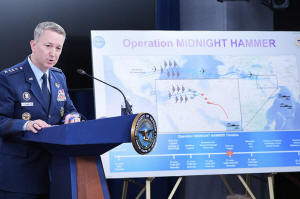Trump administration postpones classified briefings for lawmakers on
Iran
[June 25, 2025]
By MARY CLARE JALONICK and KEVIN FREKING
WASHINGTON (AP) — The Trump administration on Tuesday postponed
classified briefings for Senate and House members as lawmakers look for
more answers about President Donald Trump's directed strikes on Iranian
nuclear facilities over the weekend and his announcement on Monday that
the two countries had reached a ceasefire agreement.
The Senate briefing has been rescheduled for Thursday so that Defense
Secretary Pete Hegseth and Secretary of State Marco Rubio can attend,
according to multiple people with knowledge of the scheduling change who
would only discuss it on the condition of anonymity. House Speaker Mike
Johnson, R-La., said on social media that the House briefing will now be
held on Friday, “details to follow.”
Trump proclaimed on social media that Israel and Iran had agreed that
there will be an “Official END” of their conflict. That tentative truce
briefly faltered Tuesday when Israel accused Iran of launching missiles
into its airspace, but Trump later declared it was “in effect!”
The separate briefings for the House and Senate were to be led by CIA
Director John Ratcliffe and Director of National Intelligence Tulsi
Gabbard, along with Gen. Dan Caine, chairman of the Joint Chiefs of
Staff, and deputy secretaries of state Christopher Landau and Steve
Feinberg.
Democrats in Congress, along with some Republicans, have many questions
about Trump’s unilateral decision to launch military action, arguing he
should have gone to Congress for approval — or at least provided more
justification for the attacks. Congress has not received any new
intelligence since Gabbard told lawmakers in March that the U.S.
believed Iran was not building a new nuclear weapon, according to two
people familiar with the intelligence. The people insisted on anonymity
to share what Congress has been told.

Senate Democratic Leader Chuck Schumer said it is “outrageous” that the
administration postponed the briefings.
“There is a legal obligation for the administration to inform Congress
about precisely what is happening,” Schumer said. “What are they afraid
of? Why won’t they engage Congress in the critical details?”
California Rep. Pete Aguilar, chair of the House Democratic caucus, said
that lawmakers "need evidence, we need details and we need to know them
now.”
House Majority Leader Steve Scalise, R-La., defended the
administration's handling of the information, saying the briefings were
postponed because “the situation is still developing" amid the recent
ceasefire announcement.
Many lawmakers feel they have been left in the dark on what led to the
strikes and amid escalating tensions between the White House and
Congress over the role of the United States internationally —
disagreements that don’t always fall along party lines.
Democrats have been generally suspicious of the Republican president’s
strategy, and his motives abroad, but some believe the U.S. could have a
role in supporting Israel against Iran. Others strongly believe the U.S.
should stay out of it.
Some of Trump’s strongest Republican supporters agree with the Democrats
who oppose intervention, echoing the president's years of arguments
against “forever wars.” But most Republicans enthusiastically backed the
strikes, saying Trump should have the power to act on his own.
[to top of second column]
|

Joint Chiefs Chairman Gen. Dan Caine speaks during a news conference
at the Pentagon in Washington, Sunday, June 22, 2025, after the U.S.
military struck three sites in Iran, directly joining Israel's
effort to destroy the country's nuclear program. (AP Photo/Alex
Brandon)

Speaker Johnson said Tuesday that the strikes on Iran’s nuclear
facilities were "clearly” within Trump’s powers and went as far as
to question the constitutionality of the War Powers Act, which is
intended to give Congress a say in military action.
“The bottom line is the commander in chief is the president, the
military reports to the president, and the person empowered to act
on the nation’s behalf is the president,” Johnson told reporters.
After Trump first announced a ceasefire between the two countries on
Monday, Republicans immediately praised him. Sen. Bernie Moreno,
R-Ohio, suggested in a post on X that Trump should be nominated for
the Nobel Peace Prize. Sen. Katie Britt, R-Ala., posted: “Historic!
The President of Peace!”
But Democrats said they wanted more information. After Iran’s
retaliation on the U.S. base in Qatar earlier in the day on Monday,
Schumer said he wanted an additional classified briefing “laying out
the full threat picture, the intelligence behind Iran’s retaliation,
and the details, scope, and timeline of any U.S. response.”
Senate Democrats are also forcing a vote as soon as this week on a
resolution by Sen. Tim Kaine, D-Va., requiring congressional
approval for specific military action in Iran.
“You have a debate like this so that the entire American public,
whose sons and daughters are in the military and whose lives will be
at risk in war, get to see the debate and reach their own conclusion
together with the elected officials about whether the mission is
worth it or not,” Kaine said.
While he did not seek approval, Trump sent congressional leaders a
short letter Monday serving as his official notice of the strikes,
two days after the bombs fell.
The letter said that the strike was taken “to advance vital United
States national interests, and in collective self defense of our
ally, Israel, by eliminating Iran's nuclear program.”
While previous presidents have deployed armed forces without
permission from Congress, Democratic Leader Hakeem Jeffries said
that those administrations explained “the imminent threat that
justified their action.”
“We’ve asked that question,” Jeffries said. “We have no answers from
the Trump administration.”
___
Associated Press writers Lisa Mascaro, Leah Askarinam, Matt Brown
and Joey Cappelletti contributed to this report.
All contents © copyright 2025 Associated Press. All rights reserved
 |